The Gondonian Thand
HISTORY
The Thentian Empire
The Bartering system was all the world knew until late in the Fifteenth Age (14750KR) when The Thentian Empire created their own Currency,Imperial Thents (Pronounced Fents).The Thentians only created three coins,all circular,The Copper Thent,Silver Thent and Gold Thent.One side of the coin had the face of the Emperor(A fairly good likeness),the reverse side had the Year.
The Elven Kingdoms of Elosia & Pelosia
The Elven Kingdoms of Elosia & Pelosia followed the Thentian idea,and within a decade had created their own Currencies.The Elosi Imperial Dragons (14753KR).The Elosi created three coins,The Copper Dragon,Silver Dragon and the Golden Dragon.The coins each had a Dragon in flight on one side and the Year on the reverse,all circular.The Pelosi created The Imperial Crowns (14758KR),later to be known as The Pelosian Crown .The Pelosi also created only three coins,The Copper Crown,Silver Crown and the Golden Crown.They all depicted a Crown on one side and the Year on the reverse,again all circular.The Dwarven Kingdom of Gondonia
The Dwarves of The City of Dun Gondalin in The Kingdom of Gondonia continued to use the Bartering system as they have always done,refusing to produce a coinage currency (The Stubborness of Dwarves,aye). Fifty Years after The Thentians created the first Coinage Currency the Dwarves of Dun Gondalin finally created their own coinage,The Gondonian Thand (Pronounced Fand) in the Year (14800KR).The Gondonian Thand
They created six coins of six different valuable metals,shapes and symbols (Engravings).The Copper Axe , Circular,depicting A Mountain (The Kings Ridge) with the Year on one side,and two crossed Axes on the reverse.The Bronze Helm,Scalloped,depicting The Fortress City of Stormhall with the Year on one side,with a full faced Helm on the reverse.The Silver Shield,Square,depicting The City of Dun Gondalin with the Year on one side,and a Shield (With Coat of Arms) on the reverse.The Electrum Hammer,Hexagon,depicting the face of Queen Thelora Stormhammer (The Current Queen) with the Year on one side,and two crossed Hammers on the reverse.The Gold Crown,Octagon,depicting the face of King Thand Stormhammer (The Current King) with the Year on one side,and a Crown on the reverse.The Platinum Dragon,Decagon,depicting the face of The God-King Gond Stormhammer with the Year on one side,and a Dragons Head profile on the reverse. By the Year 15485KR,The Bronze Helm had been Discontinued from production by King Thand Stormhammer III,never to be replaced.The Electrum Hammer now depicted The Fortress City of Stormhall instead of the face of the current ruling Queen.Of Emperors & Kings
In the Year 14802KR the four Rulers,The Thentian Emperor,The Kings of Elosia & Pelosia and King Thand Stormhammer of Gondonia all met for a Council meeting in The Thentian Capital to discuss the market price of Metals,Coinage,Gems,Food Produce,Livestock and anything else of value.It was decided that the value of Gold per Ounce (30 grams) would be 12 Gold Pieces (being Crowns,Dragons,Thands or Thents).Iron at the time was 1 GP per Ounce.The current price of Gold per Ounce is 2 Gold Pieces & 6 Silver Pieces,with Iron being 4 Gold Pieces per Ounce. The Dwarves at the time were Powerhouses when it came to Mining,producing ten times more than the others put together in Metals and Gems.Both of the Elven Kingdoms excelled in Food Produce,Livestock and Timber,with other wooden made products.The Thentians produced Food produce and Livestock (Horses mainly),but excelled in Clothing;Wool,Linens and Leather.Each Nation brought something to the table which would benefit the others.
MANUFACTURING PROCESS
Minting or Coining is the process of manufacturing coins(1) using Stamping(2) which is now commonly known in Metalworking(3) as "Coining"(4).This process is different from Cast Coinage(5),and can be classified in Hammered Coinage(6) or Hammering and Milled Coinage(7) or Milling.
The First Process,Coin Dies(8) were manufactured individually by hand by artisans known as engravers.In demanding times,such as Wartime,Dies were still used even when they became very worn or even when they cracked.The die that was on the hammer side,usually the reverse (back),tended to wear out first.The Coin Blanks were usually hot prior to striking.On some coins,some believe the tongs used to move the heated Blank left permanent center indentations on the finished coins.
(1) A coin is a small,flat,round or other shaped piece of metal used as legal tender.They have a standard weight,and are produced in large quantities at a mint for trade purposes.They are most often issued by a Kingdom,Nation or Government. (2)Stamping is the process of placing flat sheet metal in blank form into a stamping press where a tool and die surface forms the metal.Stamping includes a variety of sheet-metal forming manufacturing processes,such as punching or embossing using a metal press or stamping press.This could be a single stage operation where every stroke of the press produces the desired form on the sheet metal or could occur through a series of stages. (3)Metalworking is the process of working with metals to create individual parts or large-scale structures.The term covers a wide range of work from Weapons & Armour,Framework for bridges to Coinage and delicate jewelry.It therefore includes a wide range of skills,processes and tools. (4)Coining is a form of precision stamping in which the metal workpiece is subjected to high stress on the surface of the material.The beneficial feature is that the high stress hardens the surface,while the metal retains its toughness.The term comes from the initial use of the process:Manufacturing of coins. (5)Cast coinage refers to coins made by pouring melted metal into a mold,"Casting".It has been used for regular coins, particularly in the Early Years and still used Beyond The Eastern Frontier.The method differs from the current mode of coin production,which is done by striking coin blanks that have been cut out of metal sheets.This method is also used by forgers. FORGERIES:Silver,Electrum and Gold coins can be faked by using other metals to make up the official coinage weight.Other metals used are Brass,Iron and Nickel mixed together with a little of the original. (6)Hammered coinage is the most common form of coins produced since the invention of coins,contrasting to the cast coinage and the later developed milled coinage. (7)The term milled coinage is used to describe coins which are produced by a Press,rather than by manually hammering coin blanks between two dies or casting coins from dies. (8)Coin Die is one of the two metallic pieces that are used to strike a coin,one per each side of the coin.A die contains an inverted version of the image to be struck on the coin.Striking a coin refers to pressing an image into the blank metal disc. Current Coin Dies made out of hardened steel are capable of producing several thousands of coins before they are melted down and reused.
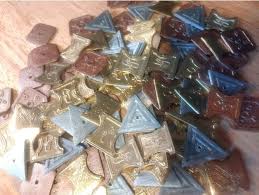
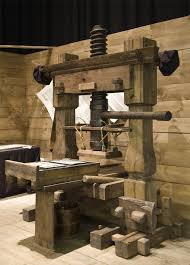
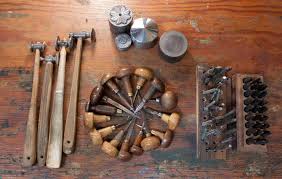
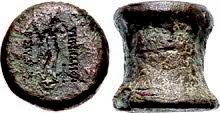

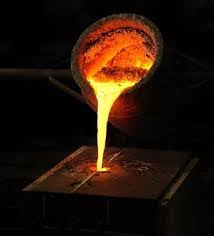
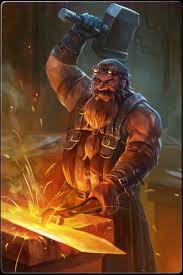

Comments